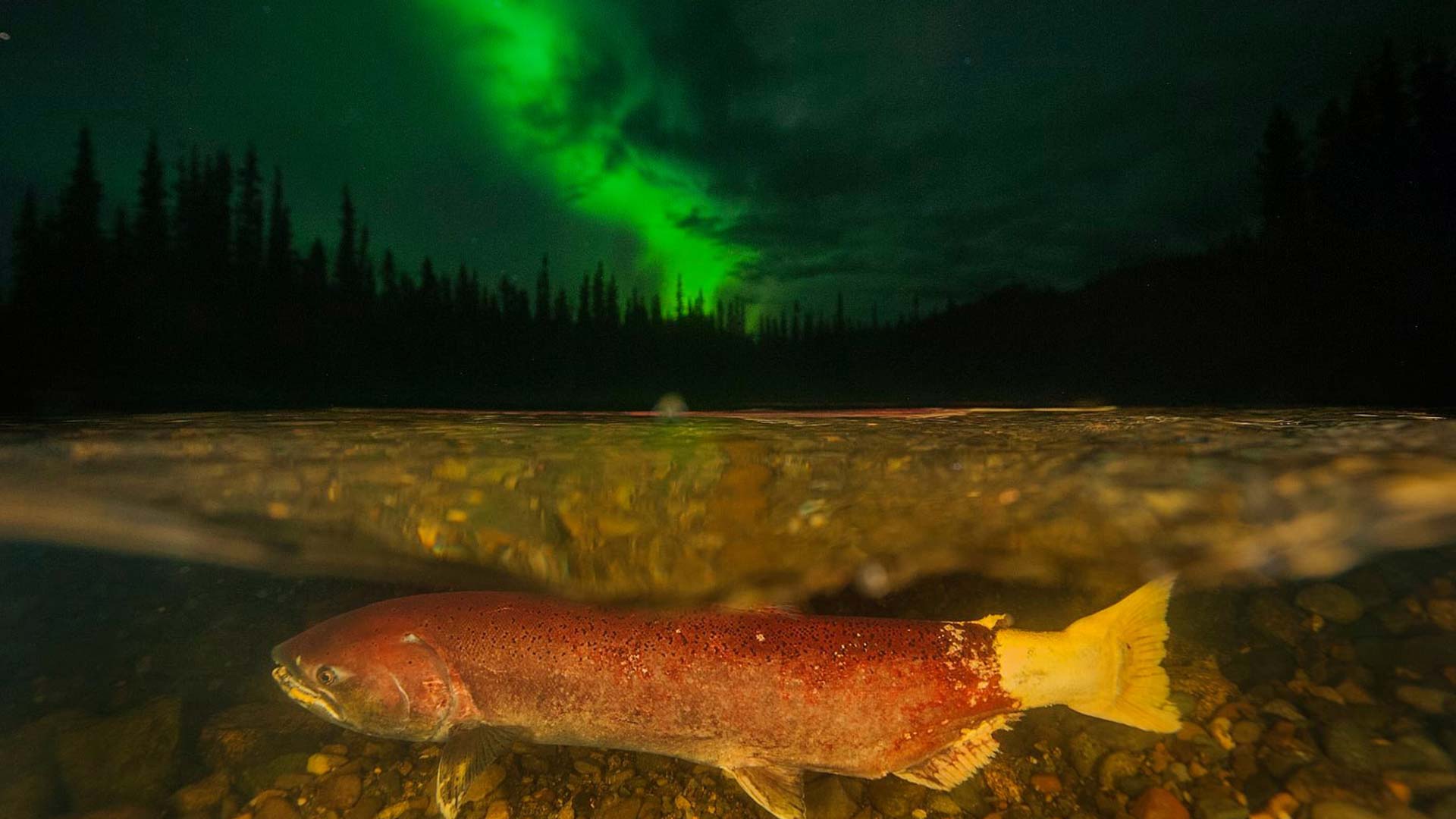A non-governmental committee that advises the federal government and First Nations in the Yukon on salmon issues is asking First Nations to stop harvesting salmon because of a drop in the stock.
The Yukon Salmon sub-committee posted on its Twitter account Wednesday that there were “Record low Yukon River fall chum and coho.”
Chinook salmon have a deep spiritual and cultural connection to Indigenous peoples living throughout the Pacific northwest, while also serving as a primary food source.
Sean Smith of Kwanlin Dün First Nation, can still remember the stories his grandmother would tell him of the Chinook salmon.
In her day the fish were plentiful.
“My grandma would tell me stories of her actually going salmon fishing and cutting and drying the salmon for weeks at a time, enough to build up enough cash reserves for winter,” he tells APTN News.
But just two generations later, it’s “changed dramatically,” Smith says overlooking the Yukon River from his mother’s property in Whitehorse.
“I’d say it’s 10 to 15 years we haven’t fished, we haven’t put a net through here…It’s something that’s definitely affected our cultural connection to the river.”

Chinook migrate through Alaska to the Yukon to spawn so they’re managed under international treaty to ensure enough fish cross the border.
That spawning escapement goal is between 42,500 to 55,000 fish.
But as of Aug.31, only 31,631 Chinook were counted by sonar near the U.S. border – well below the minimum treaty-obligated escapement goal.
That number is also down from last year, when only 33,550 Chinook made it to their spawning grounds.
It’s nothing new.
Chinook stalks have been declining for decades, and the spawning escapement goal hasn’t been met since 2018.
Other Yukon River salmon like chum are also down.
A Sept.7 Yukon River salmon update from the department of Fisheries and Oceans Canada states the average number of fall chum estimated to have migrated past a sonar site in Alaska near the mouth of Yukon River typically falls around 723,413 fish.
However, only 146,172 fall chum have been counted.
The update further states “This year’s summer chum run was the poorest on record,” though it doesn’t list exact numbers.
Yukon First Nations taking precaution
Record low Yukon River fall chum and coho.
Fall chum: 99,000 average 870,000
Coho: 37,000 average 240,000Alaska has maintained the salmon closure for chum as spawning goals will not be met for fall chum.
Photo: @matherpeter pic.twitter.com/vD2uW12pXr
— YSSC (@yukonsalmon) September 15, 2021
James MacDonald, chair of the Yukon Salmon Sub-Committee, an advisory board under the Yukon First Nations final agreements, says there’s mostly likely a combination of factors affecting Yukon River salmon.
Those include older fishing practises that entailed removing the oldest and most desirable fish leaving the smaller, less mature fish behind, as well as unknown occurrences in marine fisheries and the marine environment.
He says climate change, too, has played a part.
“(These) salmon are cold water fish and with water temperature increasing, it’s had a detrimental effect on their mortality now and into the future,” he says.
With Chinook numbers low again this year, he says the committee has asked for First Nations to refrain from harvesting the salmon for the remainder of this year.
“We’re asking all residents, all Yukon First Nations included to just not fish for salmon for this season at all so we can ensure as many salmon reach their spawning grounds as possible, to ensure that they spawn for future cycles,” he says.
Yukon First Nations have followed suit, including Na-Cho Nyak Dun First Nation in Mayo and Vuntut Gwitchin First Nation in Old Crow.
MacDonald says Yukon First Nations are concerned about Yukon River salmon.
“What we’re hearing are large concerns about conservation, overharvesting in both the U.S. fisheries and marine fisheries, and basic overall more competition in the marine environment which leads to less returning salmon in future years,” he says.
“It’s a combination of factors we hear consistently from communities, from Yukon First Nations, from anybody that’s interested in salmon.”
The issue was also raised at an all-candidates forum last week hosted by the Council of Yukon First Nations.
All five Yukon candidates running in the federal election say they’re aware of the issue and would work with Yukon First Nations to help tackle the problem.
MacDonald says he’s pleased to see federal candidates are paying attention to the plight of the Yukon River salmon.
“That’s a positive signal that people care about these species, that they want to maintain and protect these stalks now and in the future. They’ve been part of the landscape for millennia and we want to keep it that way,” he says.
Meanwhile, Smith is hopeful traditional knowledge of salmon management won’t be overshadowed by political bureaucracy.
“When you have folks in Ottawa making decisions on our behalf, do they really understand what’s happening here? I don’t know,” he says
“Thing work at different levels which is good on paper but in terms of best practises on the land I think that’s what we really need to think about.”
Smith says he would like to see a united plan with the Canadian and U.S. governments to address issues like the salmon that have been affected by climate change.
“I think there’s some things that could be done but until we see the folks that get elected into office and are in power to make change, advocate for change and address some of these larger systemic issues, these systemic issues are (going to stay) prevalent within a society,” he says.
While Smith says this year’s Chinook numbers are “disheartening,” it’s important to stay positive and look to the past for guidance.
“We want to have hope and do what we can to really put our efforts to help the salmon recover. Those are things we need to do for the bigger picture.”










